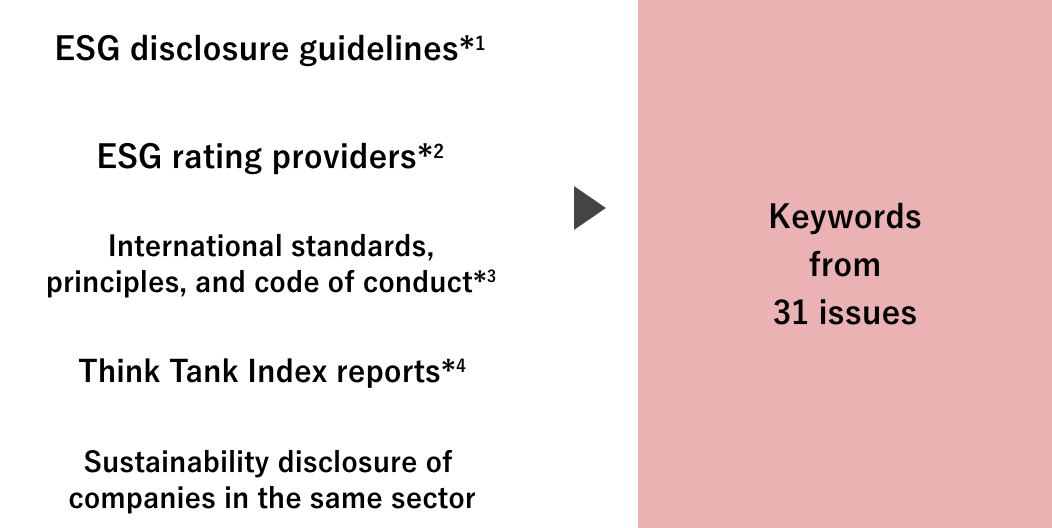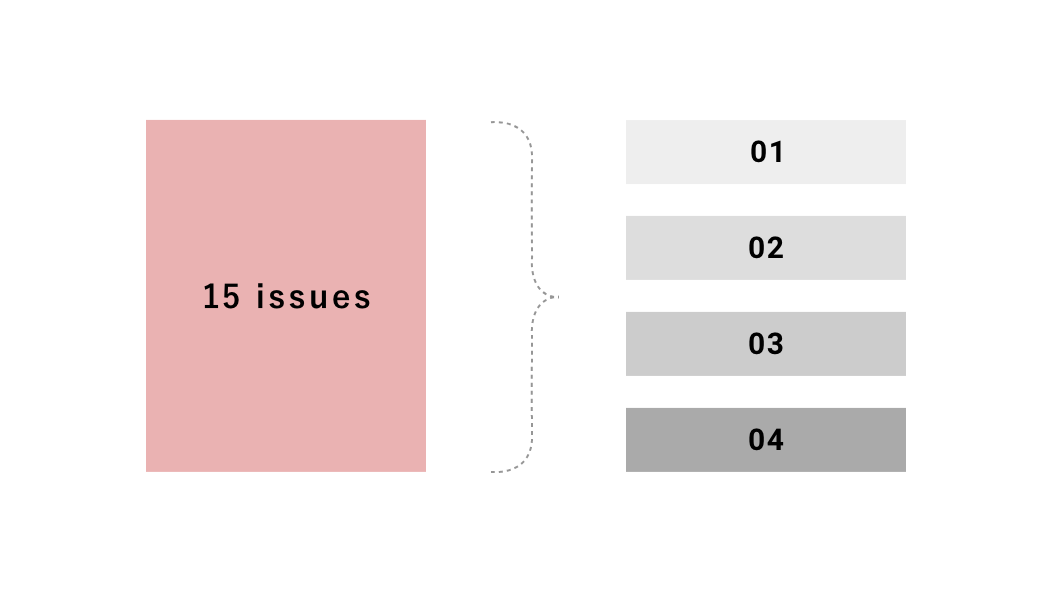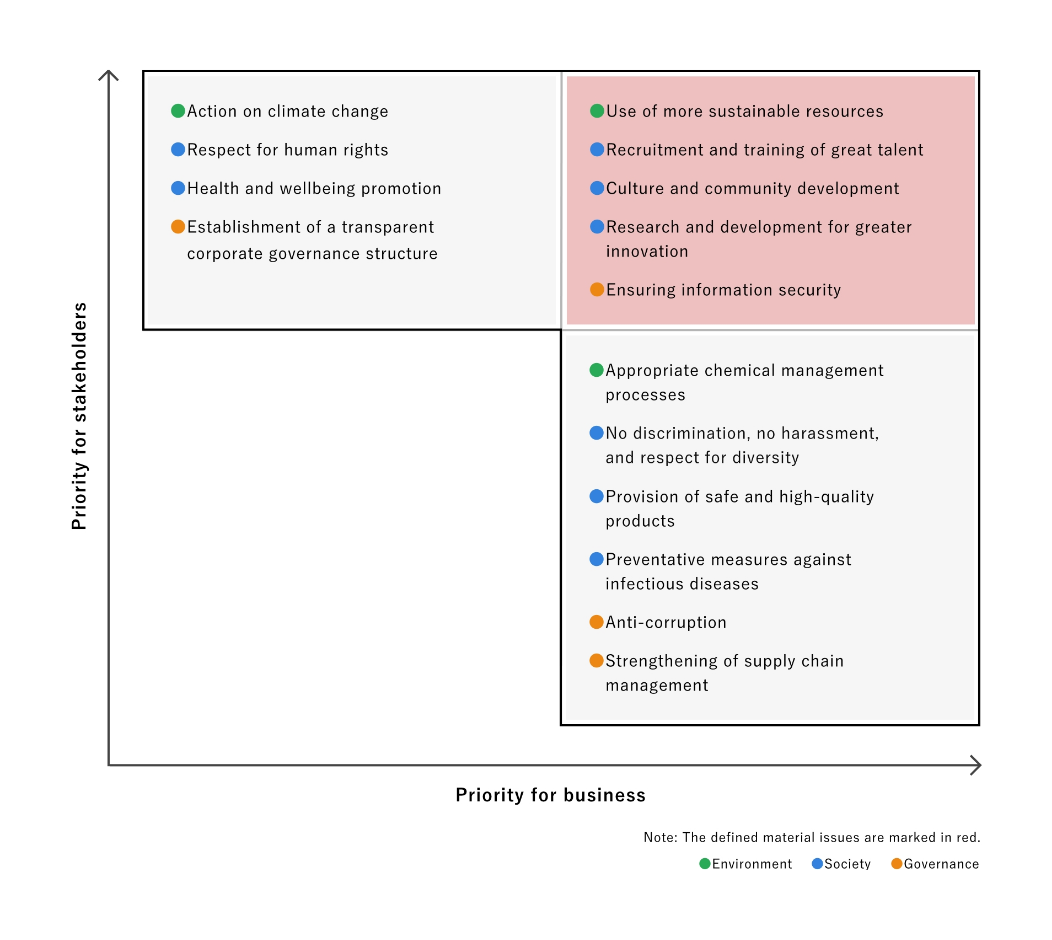MATERIALITY
OUR FOUR MATERIAL ISSUES
The Noritsu Koki Group has been working to address the rapid and dramatic social changes that have occurred over the past decade or so, and strives to create businesses that are indispensable and can serve as part of the infrastructure of society. To respond to increasingly serious social and global environmental challenges, we have identified four material issues that we believe we must address in order to continue to fulfill our Mission of delivering “Prosperity for society and people,” and as such, are working to integrate sustainability into our business operations.
In identifying the material issues, we evaluated social and environmental issues that the Group should consider from the perspectives of “priority to stakeholders” and “priority to our businesses.”
| Social Issues | Assessment Background | |
|---|---|---|
|
01
Shaping the future and making a positive contribution to creating a prosperous society and enriching people’s lives by manufacturing products that society needs
|
|
Contributing to the realization of a better future society by providing products and services that the world needs has been the social mission of the Group, which is rooted in manufacturing, from the day it was founded. We work to provide safe, high-quality products, and at the same time,make strategic R&D investments aimed at creating new technologies and products in order to supply new value to people’s lives. |
|
02
Enhancing our supply chain framework to make it more environmentally and socially responsible
|
|
Climate change due to global warming is causing extreme weather events such as drought and floods. It is having a significant impact on the lives of people around the world and diverse ecosystems. Respecting the human rights of the people who are impacted by business activities is an important responsibility of companies. Responding to climate change and considering the human rights of stakeholders is essential for the Group to be able to continue its business operations. As such, we will implement measures to address climate change, as well as environmental initiatives that look at the entire lifecycle of the products we supply to customers. In addition, we will work to establish a supply chain that takes social issues, including human rights, into account based on the Group Procurement Policy and the Group Human Rights Policy. |
|
03
Creating inclusive workplaces where diversity is respected and all employees can thrive and contribute with a futureoriented mindset
|
|
For the Noritsu Koki Group, human resources are the driving force of sustainable growth. To realize our Mission of delivering “Prosperity for society and people,” it is important that all Group employees have open minds and work with a proactive and future-oriented attitude and approach. To ensure that, we will attract talented people, maintain systems to support their success, respect the values and individuality of every employee, and take measures to prevent harassment and discrimination. By doing so, we will foster a vibrant organizational culture in which all employees can dedicate themselves to their work and contribute with a future-oriented mindset. |
|
04
Enhancing our sound corporate governance structure to achieve sustainable growth
|
|
Enhancing corporate governance is a key management priority that we should continue to promote in order to ensure the Noritsu Koki Group’s sound development. At Noritsu Koki, we will work to increase the effectiveness of the Board of Directors, speed up decision-making, and establish highly transparent management. For risks that could hinder the sustainable growth of the Group, we will identify the critical risks related to our businesses, and work to appropriately manage those risks and reduce their impact. In addition, from the standpoint of business continuity, every employee is required to act responsibly with a focus on compliance. By making all directors and employees of the Group aware of the Noritsu Koki Group Code of Conduct, which specifies the conduct expected of them, we will build a corporate culture in which compliance is given top priority. |
- Environmental
- Social
- Governance
MATERIALITY ACTION PLAN AND PROGRESS
To take action on the material issues, we developed a Materiality Action Plan that sets annual targets, and are promoting the plan throughout the Group. The progress of the action plan is managed based on the Group’s sustainability promotion framework.
| Materiality | Our actions | FY2024 Plans | FY2024 Results | FY2025 Plans | Reference | |
|---|---|---|---|---|---|---|
|
Contributing to society and the community through business operations
|
01
Shaping the future and making a positive contribution to creating a prosperous society and enriching people`s lives by manufacturing products that society needs
|
|
|
|
|
Quality Management |
|
|
|
|
|
||
|
Carried out each Group company plan | Carry out each Group company plan | Carry out each Group company plan | Supporting Cultural Development And Local Communities | ||
|
02
Enhancing our supply chain framework to make it more environmentally and socially responsible
|
|
|
|
|
Delivering Environmentally Responsible Products | |
|
|
|
|
Responding to Climate Change | ||
|
|
|
|
|||
|
Establishing a robust corporate foundation
|
03
Creating inclusive workplaces where diversity is respected and all employees can thrive and contribute with a future-oriented mindset
|
|
|
|
|
Human Resource Management |
|
|
|
|
Human Resource Management | ||
|
|
|
|
|||
|
04
Enhancing our sound corporate governance structure to achieve sustainable growth
|
|
|
|
|
Corporate Governance | |
|
|
|
|
Risk Management | ||
|
|
|
|
Compliance | ||
- *1All executives and employees at Nortisu Koki Group including part-time, temporary staffs and contractors (only permanent employees at soliton and Taibao, subsidiaries within Teibow Group and JLab, excludes long-term absentees at each company)
- *2A subsidiary at AlphaTheta (in Singapore) is excluded due to start-up phase
MATERIALITY ASSESSMENT PROCESS
We have identified our materialities by conducting our materiality assessment based on the following processes with cross group cooperation and the help of external advisory experts.
STEP 01Identify potential social issues and impacts
Working to incorporate diverse stakeholder expectations, we used 11 different globally-recognised sustainability standards such as ESG disclosure guidelines, evaluation criteria provided by ESG evaluation agencies, and codes of conduct. We performed an analysis on sector-specific material issues and identified 31 potential social issues that impact our business in order to define our materiality.

- *1 GRI Standards, SASB Standards
- *2 DJSI (RobecoSAM), FTSE, MSCI
- *3 SDGs, ISO26000, Ten Principles of the UNGC, OECD Guidelines for Multinational Enterprises
- *4 World Economic Forum(WEF)“Measuring Stakeholder Capitalism”, “Resolving Societal Issues Through Innovation — Listings of Societal Issues” FOR CO-CREATING THE FUTURE
STEP 02Assess and prioritize material topics
The 31 social issues selected in Step 1 were evaluated and weighted using a scoring method, incorporating the views of stakeholders and Group businesses, and prioritized according to the following criteria.
- 1)Stakeholder Input: assessment based on the relative interests and importance of stakeholders by external advisory experts and scholars.
- 2)Business Impact and Values: reassessing the evaluation scores provided by our 4 major group businesses based on the business impact and values of the Noritsu Koki Group.
As a result, we identified 15 social issues that matter the most to our business and stakeholders.
STEP 03Define materiality
The 15 potential social topics selected in Step 2 were clustered into groups on the basis of our MVV and business model. We refined a list of core corporate material issues that could highly affect our business.
Having had insightful feedback from external advisory experts and far-reaching discussions with senior management including our CEO, we integrated them into 4 significant material topics that need to be addressed and worked on as a group.

STEP 04Determine and disclose the materiality
We designed a materiality matrix and validated the credibility of the identified 4 material issues. Approved by the Board of Directors, we finally defined them as the Noritsu Koki Group’s materialities.

